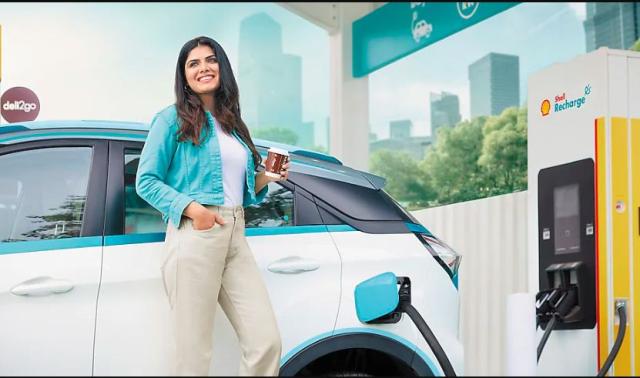U.S. electric vehicle (EV) sales of General Motors, Rivian, and Toyota reported robust EV deliveries in the second quarter, while Tesla recorded a decline.
Despite these gains, the demand for EVs has been slower than anticipated, hindered by high borrowing costs, economic uncertainty, and consumer preference for gasoline-electric hybrids. This situation has prompted Tesla and other EV brands to slash prices or offer greater incentives to attract buyers, Reuters news report said.
Analysts suggest that the pressure to continue reducing manufacturing and battery costs will persist, AP news report said.
According to International Energy Agency, global EV sales are expected to rise to 16.6 million vehicles this year, up from 13.7 million in 2023, with China’s growth outpacing other regions.
However, analysts caution that Tuesday’s sales figures alone are insufficient to predict a resurgence in EV sales growth. “We expect bumps along the way for the next few years as the transition moves from early adopters to mainstream buyers,” said Sam Fiorani, vice president at research firm AutoForecast Solutions. “Some quarters will be up, some will be down, but overall, growth won’t be as strong as in the past few years.”
General Motors
General Motors reported a 40 percent increase in U.S. EV sales in the second quarter. “We can win as more customers embrace EVs, and we can keep winning if they prefer the engine technologies they know,” said Marissa West, GM’s North American president, in a statement.
General Motors says it achieved record EV sales with 21,930 deliveries in the second-quarter, up 34 percent over Q1 and 40 percent year-over-year.
General Motors’s EV business recorded 38,355 first half deliveries, including 21,930 in the second quarter – both are GM records.
GM retail EV registrations increased 17 percent year-to-date, outpacing the retail industry’s 10 percent gain. GM will offer 10 EV nameplates by year-end. Top states for GM EVs are California, Texas, Florida, New York, Michigan.
General Motors EV business says 40 percent of Blazer EV buyers are new to GM, winning customers from Jeep, Ford, Hyundai / Kia.
General Motors says its Equinox EV is the most affordable EV with more than 300 miles of EPA-estimated range – arriving at dealers now. General Motors’s Silverado EV RST – the longest-range electric truck, even while towing – began deliveries in June.
General Motors also observed that second-quarter is the HUMMER EV’s best quarter with sales growing 76 percent over Q1. Almost 70 percent of buyers of HUMMER EV are new to GM.
Rivian
Rivian said it delivered 13,790 vehicles in Q2 and produced 9,612 units at its manufacturing facility in Normal, Illinois.
Rivian reaffirmed full-year production guidance of 57,000 units. During Rivian’s investor day last week, the EV startup predicted Q2 deliveries totaling between 13,000 and 13,300.
Toyota
Toyota said more than 454,000 electrified vehicles sold in the first half of 2024, representing 38.3 percent of total sales volume. Toyota says 29 electrified Toyota and Lexus vehicle options available at dealerships, the most among any automaker. Toyota’s second quarter electrified vehicle sales totaled 247,347, up 63.1 percent on a volume and DSR basis, representing 39.8 percent of total sales for the period.
Toyota Motors North America’s first half U.S. sales totaled 1,186,647 vehicles, up 14.3 percent on a volume basis and up 12.8 percent on a DSR basis. First half electrified vehicle sales totaled 454,197, up 67.9 percent on a volume basis and up 65.7 percent on DSR basis representing 38.3 percent of total sales for the period.
“The first half of 2024 surpassed our high expectations thanks to our teams’ continued focus on customers with even more great products, including electrified vehicles,” said Jack Hollis, executive vice president, Sales, Toyota Motors North America.
“Lexus recorded its best-ever first half in its 35-year history, Toyota remains the number one retail brand in the industry, and our diverse portfolio of 29 electrified vehicle options between the Toyota and Lexus brands made up nearly 40 percent of our total sales volume through June.”
Toyota, which has benefited from the demand for hybrid gasoline-powered vehicles, acknowledged the growing interest in EVs. Toyota plans to start building two new EVs for the U.S. market at its Kentucky and Indiana plants starting in 2026. “We’re hearing positive demand from the marketplace,” said Damon Rose, vice president of sales for the Toyota brand.
Kia
A Kia spokesman noted that while the percentage growth might not be as sharp as a year earlier, overall EV sales continue to grow at a strong pace.
To stimulate demand, China has introduced subsidies of up to 10,000 yuan ($1,375.29) for auto trade-ins. Automakers like Tesla and BYD are offering zero-interest loans and no-down-payment options in that market. These incentives, along with similar efforts by Tesla in the United States, helped the EV market leader surpass delivery expectations despite a second consecutive quarterly decline.
Tesla
Tesla has shifted its focus in recent months to artificial intelligence efforts, including its soon-to-be-unveiled robotaxi product and Optimus humanoid robot, to counter the slowdown in EV sales, which generate more than 80 percent of its quarterly revenue.
Hyundai
Hyundai Motor America has sold 214,719 units in Q2, an increase of 2.2 percent compared with Q2 2023.
Hyundai’s HEV sales rose 42 percent compared to Q2 last year while pure EV total sales climbed 15 percent.
Hyundai sold 399,523 total units in the first half of 2024, a 1.2 percent increase compared to the first half of 2023. Hyundai Green sales saw an increase of 24 percent year-over-year.
Randy Parker, CEO of Hyundai Motor America, said: “Hyundai’s strong performance this quarter was driven by demand for IONIQ 5 along with Tucson and Santa Fe HEVs. Our focus remains on delivering a robust product mix and growing market share.”
Baburajan Kizhakedath

